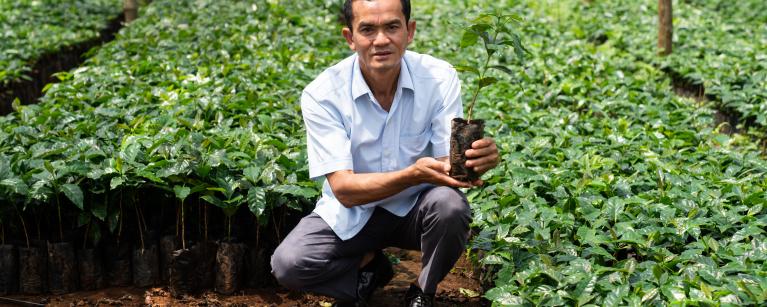SOLAR Project: Sivixay Sibounheuang For better crops and better coffee, safety comes first

Sivixay Sibounheuang For better crops and better coffee, safety comes first
Nestled atop a plateau 1,200 metres above sea level, the air in this remote corner of the Lao People’s Democratic Republic carries the refreshing aroma of coffee, promising a comforting haven for visitors seeking respite from a crowded and busy urban life. This means the Bolaven Plateau is a big tourist attraction, especially at the beginning and end of the year when it is time to harvest the coffee crop. Visitors are able to immerse themselves in the natural world and learn about coffee farming and processing involving both traditional and new techniques. But while these visitors are prized as a source of revenue and product promotion for local farmers, there are others that are much less welcome. Invasions of pests and plant diseases bring big challenges for farmers as they work to tend to their crops, and they need to not only deal with these unwanted visitors but do so safely.
Fortunately, Sivixay Sibounheuang, a trainer at the Agriculture Research Centre of Southern Laos (ARC), is ready to help them. Sivixay is confident that the use of proper agricultural techniques will enable farmers to raise healthier crops and reduce the chance of injury, and thereby help reduce farmers’ poverty by providing them a better income. But disseminating good agricultural practices among thousands of farmers is a big task. Recognizing both the scale and importance of this undertaking, Sivixay started reaching out to several organizations in order to get their help in delivering training to farmers on how to produce better quality products that have a greater sale value, as well as learning about the importance of safety.
Last year Sivixay took things a step further with the help of the SOLAR Project – a European Union-financed initiative implemented by the ILO and Oxfam – by setting up the ARC’s new Worker Information Centre to provide farmers with information on occupational safety and health. The Centre informs farmers about the importance of safety and how they can protect themselves, and has already assisted more than 1,000 farmer participants. In addition to delivering training sessions and consultations, the Centre distributes practical information by screening videos and distributing posters, flyers and other materials to farming households.
The Worker Information Centre offers dedicated training for farmers on pest/insect control, including through the use of pesticides and natural methods, as well as training on long-term health and skin care issues related to exposure to chemicals. Through the SOLAR Project these trainings have been strengthened through the introduction of occupational safety and health training sessions, which better enable farmers to care for both their crops and themselves.
Sivixay said farmers have traditionally tended to pay more attention to the care and safety of their crops than they do to their own well-being. Many farmers do not wear protective clothing or use any equipment meant to keep them safe as they work. Some people have been bitten by animals – including venomous snakes – or cut themselves when using sharp knives. “The training we provide helps them to understand what they can and cannot do to protect themselves and also what they should do if they have an accident or are bitten by a harmful animal,” he added. Following training sessions, staff at the Worker Information Centre observe farmers in the field to check that they are putting the advice into practice. Sivixay noted, however, that it can be difficult to persuade farmers of the importance of safety because it is a new concept for them and much of their farming practices are steeped in tradition. But farmers are facing an increasing number of health risks due to more frequent use of farming machinery and chemicals, making safety a more pressing priority than ever before.
“We are also trying to get them to subscribe to the social security system, as it covers hospital treatment, but of course they have to have enough money to be a member of the scheme,” he added. Sivixay hopes that in the future the Worker Information Centre will become an even larger learning centre where farmers and students can obtain a wealth of important information to help them with their work and lives. ”I am thankful to the SOLAR Project for supporting this important issue for our Lao farmers. So many farmers have come to the Worker Information Centre to ask me questions. I am confident that the Centre will continue to grow and make a difference in future.”